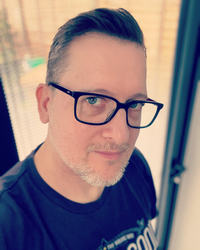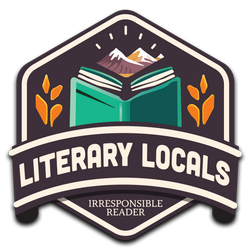A couple of hours ago, I belatedly posted about Ewington’s Comedic Epic The Hero Interviews, and now we get to hear a little from the author himself. I’ve had very few less-than-completely pleasant interactions with authors on this side, but some really stand out on the positive side. Andi Ewington fits into that category–in all our interactions over the last few months, Ewington has been kind, patient, gracious, generous, and funny. So it brings me a great deal of pleasure to share a little bit more of him with you all.
 Andi Ewington is a writer who has written numerous comic titles including Forty-Five45, Campaigns & Companions, S6X, Sunflower, Red Dog, Dark Souls II, Just Cause 3, Freeway Fighter, and Vikings. Andi lives in Surrey, England with a plethora of childhood RPGs and ‘Choose Your Own Adventure’ gamebooks he refuses to part with. He’s usually found on Twitter as @AndiEwington.
Andi Ewington is a writer who has written numerous comic titles including Forty-Five45, Campaigns & Companions, S6X, Sunflower, Red Dog, Dark Souls II, Just Cause 3, Freeway Fighter, and Vikings. Andi lives in Surrey, England with a plethora of childhood RPGs and ‘Choose Your Own Adventure’ gamebooks he refuses to part with. He’s usually found on Twitter as @AndiEwington.
Why don’t we start with a quick introduction—who is Andi Ewington, and how did he get into writing? What made him jump from comics to novels?
I’m a creative at heart; initially, I was a graphic designer for over 30 years, designing computer game packaging, advertising and branding. I got into comics with my critically acclaimed debut novel (Forty-Five), published in 2010. For nearly ten years, I built a small comic-writing side hustle alongside my day job, writing for IPs such as Just Cause, Dark Souls, World of Tanks, Vikings, and Pac-Man. In late 2018, I switched from design to writing games full-time before being promoted to Game Director. During this time, I was finding it harder and harder to secure regular comic work, so I published a series of funny tweets about cats and dogs playing Dungeons & Dragons called ‘Campaigns & Companions’. After that, my desire to see my words published as a complete novel consumed me—thus, ‘The Hero Interviews’ was born.
All authors have more ideas running around in their head than they can possibly develop—what was it about this idea that made you commit to it? What’s the appeal to you as an author about the interview structure?
I have a huge affinity for fantasy (having spent endless hours playing Dungeons & Dragons, Middle Earth RPG, Fighting Fantasy, Talisman, and Warhammer) and comedy (watching endless repeats of Blackadder, Father Ted, Alan Partridge, Monty Python). The idea slowly came to fruition after influences from The Incredibles, Creature Comforts, and World War Z—all of whom employed the Q&A format in their narrative. With so many epic fantasy yarns on the market, I wanted to publish something a little different that gave readers small nuggets of information that, when pulled together, create a bigger picture. Plus, you don’t have to believe everything in an interview—sometimes, what’s being said is only one side of a gold coin. I had done something similar with my debut graphic novel, Forty-Five—but The Hero Interviews resonates more with me because it’s written from the heart, with a plethora of personal experiences thrown in.
Between this and Campaigns & Companions, it’s pretty obvious that D&D is a pretty big influence in your mind. Do you trace your interest in storytelling to the game, or was it the other way around (assuming you can trace that in the first place)? What, for you, is the draw of that kind of game?
First and foremost, Dungeons & Dragons was the perfect social game growing up—it allowed me to stay up late with my mates, eat pizza, drink bottles of coke, and roll with laughter at the stupid situations we found ourselves in. Those were amazing days back then—and certainly a massive influence on where I am now. I especially loved subverting a carefully crafted adventure by doing things the DM hadn’t planned. Much of my storytelling spawned from Choose Your Own Adventure/You Are The Hero gamebooks (Fighting Fantasy, Way of the Tiger, Falcon, Lone Wolf). Being an only child meant I needed an escape from the boredom of solitude; those books did more to forge my love of narrative than anything else—especially as they put me central in the story as an active participant rather than a reader dragged along for the ride.
How do you approach humor in your books? Do you work to maintain a balance between it and the action/tension? Does it come naturally? Do you have to come back on a later draft and insert or delete jokes to get it right? (or I guess, insert other material to balance out the jokes?)
I find humour comes naturally; I’m always thinking of funny conversations, gags, one-liners, retorts, or situations—I love making people laugh! So, when it came to The Hero Interviews, it was a very organic process. I’d start with an overall idea, then try to subvert it somehow in a funny way—usually, as I’d work out the scene, I’d find the jokes would write themselves. Sometimes, I’d massage a joke more if I felt I hadn’t stuck the landing or cut it altogether if a beta reader didn’t respond well to the gag. As for action versus comedy, there’s always a delicate balancing act to ensure the jokes don’t get in the way of the plot or the action—killing a funny moment. So, I approached action in two ways—with what information was being shared in the interview and what was happening during the interview. This way, I’d have two opportunities for comedy to appear during an action scene, either through observations or slapstick.
I love a novel with comic footnotes. Can you talk a little about the choice to use that technique—in general, and how you decide when to use a footnote to deliver the joke rather than keeping it in the text? Do you add the footnotes while writing the “main” text or do you go back and add them later?
The footnotes came about after finishing the main draft of the story; I was struggling to further Elburn’s personality, using only questions—but I had just been reading ‘Tales From Small Planets’ by Nate Crowley, and I enjoyed the banter between the editor and the author which developed through the footnotes. I reasoned I could do something similar but have Elburn’s personality shine through the footnotes as off-the-cuff commentary. I know there are over 1700 footnotes, which can be quite a task to negotiate through—but I felt just incorporating them into the Q&A would weaken Elburn’s voice and potentially lose some of the joke’s impact (especially jokes that ran across several other footnotes). Ultimately, I feel it was the correct choice—even though I’m sure a few don’t enjoy the way it pulls them out of their reading experience*.
*If that happened to you, I’m really sorry—but I’m not sorry enough not to do it all again!
This was a long novel—even by the standards of Fantasy novels. Did you consider releasing it in smaller books (like whatshisname did with the thing about the ring)? Did you spend time thinking about the length at all, or was it a case of “this is what it took to tell my story, so that’s as long as it is”?
Oh, for sure, I knew it would be a beast of a book—and the idea of breaking it down into smaller volumes briefly crossed my mind. But, I think if I had, then it would severely hamper the whole experience of cross-referencing interviews with one another. I also wanted ‘The Hero Interviews’ to be the spiritual successor to my debut novel ‘45’, which spanned forty-five interviews—as you probably know, that’s the same number of interviews found inside ‘The Hero Interviews’.
Let’s play “Online Bookstore Algorithm” (a game I made up for these Q&As). What are 3-5 books whose readers may like The Hero Interviews?
The Hitchhiker’s Guide to the Galaxy (Douglas Adams)
Notes from Small Planets (Nate Crowley)
World War Z (Max Brooks)
Guards! Guards! (Sir Terry Pratchett)
What’s next for Andi Ewington, author?
I’m currently editing a book for a friend of mine; after that, I will start work on the sequel to The Hero Interviews—The Hero Diaries!
Thanks for your time—and thanks for The Hero Interviews, I had a blast with it and I hope you have plenty of success with it.




 Farmhouse by Sophie Blackall
Farmhouse by Sophie Blackall